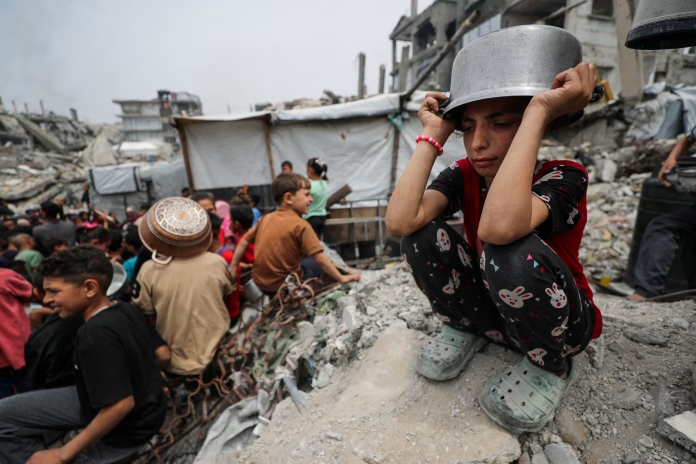GAZA, Palestine (Caasimada Online) – As a new Israeli “humanitarian pause” is decried by critics as a sham, several Arab states, including the United Arab Emirates, Egypt, and Jordan, face accusations of complicity in a public relations exercise that provides political cover for Israel while failing to stop a catastrophic famine in Gaza.
Palestinian officials and international rights groups allege that by participating in Israeli-managed aid deliveries, these nations are helping to promote a false narrative of humanitarian relief. Critics are particularly alarmed by the UAE’s involvement in an infrastructure project in southern Gaza, which they claim directly supports a reported Israeli plan to displace Palestinians permanently.
The accusations come as a severe famine grips the Gaza Strip, where Israel shut all crossings on March 2, 2025, choking off essential supplies. The war, which began on October 7, 2023, has devastated the enclave and displaced most of its 2.3 million residents.
UAE project linked to Israeli ‘Humanitarian City’
The most pointed criticism has been directed at the United Arab Emirates for its role in supplying and funding a water pipeline to Al-Mawasi, a coastal area in southern Gaza.
On July 27, the Israeli military announced it had approved the “Emirati initiative” to extend a water pipeline from an Egyptian desalination plant into southern Gaza, ostensibly to serve 600,000 people.
However, critics immediately linked the project to a reported Israeli plan for a “Humanitarian City” in the same area. According to Israeli media, Defense Minister Yoav Gallant has ordered the military to establish a tightly controlled encampment in Al-Mawasi for displaced Palestinians. The plan would reportedly see Gazans who are moved there placed under strict security checks and allowed to leave only by sea or into Egypt.
Palestinian officials argue the UAE-funded pipeline is a critical piece of infrastructure for this encampment, effectively making Abu Dhabi a partner in a strategy aimed at the long-term confinement and potential expulsion of Gazans.
Egypt and Jordan’s role in ‘media circus’
Egypt and Jordan have also been criticized for their participation in what Gaza’s government media office called a “comical show.”
Egypt, after months of stating its side of the Rafah crossing was open, began sending dozens of aid trucks through the border, which has been under Israeli military control since May 2024. Activists say Cairo’s coordination with Israel on the aid effort legitimizes Israel’s siege.
Responding to accusations of enabling the blockade, Egyptian President Abdel Fattah el-Sisi said in a televised address that “aid entry requires coordination with the other party on Gaza’s side of Rafah, currently Israel.”
Both Jordan and the UAE also conducted limited airdrops, which Palestinian official Khalil al-Hayya dismissed as “staged stunts” that were both ineffective and humiliating. He noted that the cargo of five airdrops equaled that of a single small truck.
“Israel launched a massive media campaign… backed by a flood of statements claiming that Israel was allowing aid into the Strip, with support from some complicit Arab actors,” said Ramy Abdu, chairman of the Euro-Med Human Rights Monitor. “But on the ground, only a handful of trucks actually made it in, and purely for show.”
Aid efforts fail to reach the starving
The core of the criticism is that these internationally-backed efforts are having almost no impact on the ground. The UN has largely refused to handle the aid, citing a lack of security that has allowed criminal gangs, allegedly working with Israeli forces, to loot supplies.
The United Nations Relief and Works Agency for Palestine Refugees (UNRWA) insists that only the complete and secure opening of all land crossings can address the famine, stressing that 500 to 600 trucks are needed daily.
The current pause, announced by Israel on July 26, was meant to create a safe corridor for aid. Yet, Palestinian journalist Yasser Mohamed told Al-Estiklal that the move was a PR response to growing international outrage, particularly from European nations and protesters targeting Egyptian and Jordanian embassies.
“Everyone knows that recent protests could spark demonstrations inside the two countries bordering Palestine,” he said, suggesting Israel’s motive was to help stabilize its allied Arab regimes.
Meanwhile, starving civilians receive nothing. “Breaking the famine is a lie,” said Al-Jazeera correspondent Anas al-Sharif from Gaza, emphasizing that aid is either stolen or dropped in inaccessible areas. For critics, the participation of Arab states in this process only serves to mask the reality that hunger is being used as a weapon of war.


